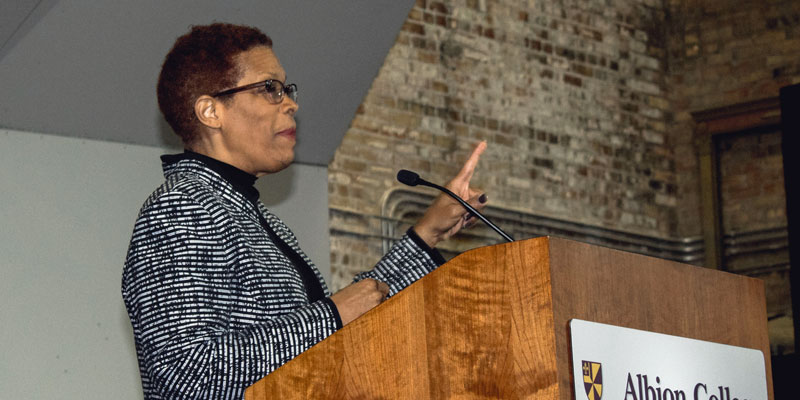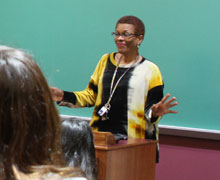Columnist Rochelle Riley Addresses MLK Convocation: ‘Let’s Fix This’
Related Posts
Connect With Us
February 27, 2019
By Jake Weber

Award-winning columnist, Letters to Black Girls founder and author Rochelle Riley in Albion’s Bohm Theatre. (Photo: Alexandria Adle, ’20)
Detroit Free Press columnist Rochelle Riley brought both criticism and inspiration to a full house February 26 at the Bohm Theatre in a powerful address at the 2019 Reverend Dr. Martin Luther King, Jr. Convocation and Community Celebration. The annual event, co-presented by Albion College and the Albion Branch NAACP, was originally scheduled for January 30 but was postponed due to the state-declared cold weather emergency.
“I’m actually glad this got moved to February, because I’m tired of this having just one day,” Riley quipped, demonstrating the keen appreciation of detail that has earned her numerous journalism awards and launched a parallel career as a social justice activist.
“Each of us has a responsibility to stop our country from raising generation after generation of a flawed America. Don’t get me wrong; America is the greatest country in the world; it was great before 2016 and it’s great now,” Riley said to the Bohm audience. “But because we are so powerful, we are loath to look at our flaws and say, ‘Let’s fix this.’ And nowhere is that more true than with race.”
Underscoring her point, Riley used several of King’s words to demonstrate that his concerns—with racial, religious and socioeconomic inequality—remain national issues more than 50 years after his death.

Riley also visited Albion’s campus, meeting with students in one of Wes Dick’s history courses.
She further noted the words of activist W.E.B. DuBois, “who said, ‘The color line will be the problem of the 20th century,’ Riley stated. “He had no way of knowing it would be the problem of the 21st century, and we have got to do something so it won’t be the problem of the 22nd.
“What we must do now is stop accepting a status quo that is unacceptable,” she continued. “We must stop speaking King’s words once a year, and fight for what he asked for. We can make America greater by working together.”
Riley acknowledged the challenge of “working together” in the present climate of social division. Nonetheless, she emphasized the moral requirement of finding common ground.
“We sometimes forget how living our best lives means becoming part of the solution to the problems that plague us. How can I live my best life when I know that third graders in Detroit can’t read at grade level?” she challenged.
“Look around you—yes, do it right now,” she said to the audience. “We can get there if we walk together, if we work together, if we know this is a righteous goal for all of us.
“The comedian Steven Wright said, ‘Everywhere is within walking distance,'” Riley concluded, “if you’ve got the time.”